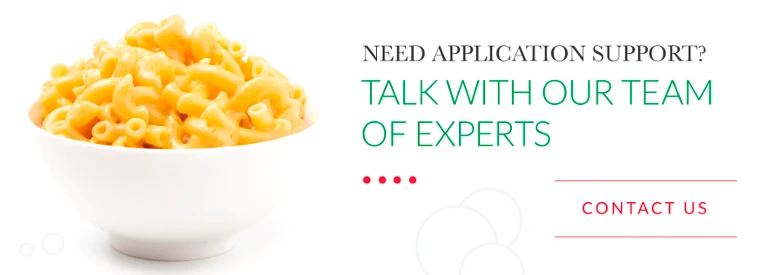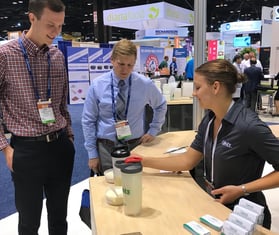
Some food and beverage ingredient suppliers simply fill orders, while others work together as partners to discover innovative product formulations that maximize flavor, texture, nutrition and appeal to consumers, all while reducing ingredient costs. A collaborative relationship with your ingredient partner can be the differentiator that ultimately contributes to your product’s success in the marketplace.
There are five key indicators and tough questions that need to be asked when considering a new ingredient partner. Making sure the following bases are covered will help ensure a successful application and, most importantly, provide results that your customers will rave about.
- Ingredient Quality
- Facilities that Ensure Food Safety
- Industry Qualifications
- Formulation Expertise
- Proactive Partnership
1. Ingredient Quality
Clearly, the #1 factor determining the appeal of products found on grocery shelves is flavor, and high-quality ingredients will provide the best results; that’s a given. But there’s more to consider in the food and beverage industry. Does your partner offer ingredients that can only be used for limited applications, or a range of ingredients that are versatile enough to be used across multiple formulations?
It’s also important to know whether your formulation partner helps reduce ingredient costs while still meeting consumer demands for cleaner labels with all-natural, protein-packed, lower-fat ingredients. If your formulation partner can’t offer solutions and doesn’t actively pursue these types of evolving trends in the food industry, it may be time to explore other options.
Related:
10 Reasons to Use Whey Protein
2. Facilities that Ensure Food Safety
Food safety is critical, and a major contributor to making sure your product meets strict compliance standards is the facility in which it’s manufactured. Are you familiar with the overall quality of your supplier’s facilities? What protocols and safety measures do they have in place to ensure cleanliness and to prevent contamination, and how about their product testing capabilities? Are raw materials sourced in the United States and FDA approved or imported from foreign countries that lack the same food safety regulations?
Ask whether they have the latest formulation technology platforms and equipment that can consistently produce the same results and quality standards you expect every time. This lets you know whether their facilities are state-of-the-art or lagging behind leading industry standards. All these factors play an important role in protecting your customers’ well being – and your reputation.
3. Industry Qualifications
When considering a formulation partner, ask for references to determine if they have similar application experience. Whether you’re providing consumers with savory sauces and creamy beverages, or delicious snacks and frozen treats, look for assurances that your partner has experience in your area of focus.
Ask about the types of projects your ingredient supplier has worked on in the past, and consider whether their qualifications are sufficient to warrant the risks of using an inexperienced provider. Also, ask about their research and development capabilities which can give you a sense of their innovative spirit.
4. Formulation Expertise
A company is only as good as its people, and how you’re treated plays a major role in developing a true partnership. If a company is too big, you can feel like you are just a number; too small, and you’ll likely develop concerns about a company’s ability to meet your demanding specifications and deadlines.
Look for a partner that’s eager to develop those important personal relationships, yet big enough to have developed efficiencies and draw the best talent, including food scientists and formulation development experts with years of experience. These experts can help you improve your product’s nutrition, reduce fat or even help you find ways to extend shelf life.
5. Proactive Partnership
A key to any partnership is collaboration. Look beyond your current needs and consider future product development and how your ingredient supplier can accommodate your needs long term. A true partner will also stay engaged with you and share insights about emerging food trends and ways in which they can help your company maintain a competitive advantage over others in similar markets. They’ll help you think ahead to what’s next.
Making sure your ingredient supplier is able to deliver on each of these five areas will lead to greater efficiencies and increased profitability. The experts at Grande Custom Ingredients Group — manufacturer of the highest quality whey protein ingredients — are eager to demonstrate what a partnership can look like and will help you solve even your toughest formulation challenge.
For example, they’ll work with you to reduce or replace your high-fat, high-cost food ingredients like cream, butter, milk, cheese, eggs and more, while maintaining and often enhancing your product’s intended mouthfeel and flavor.
Contact us today to start a conversation about how whey protein products can improve your formulations and your bottom line, and discover what a real ingredient partnership should look like.




